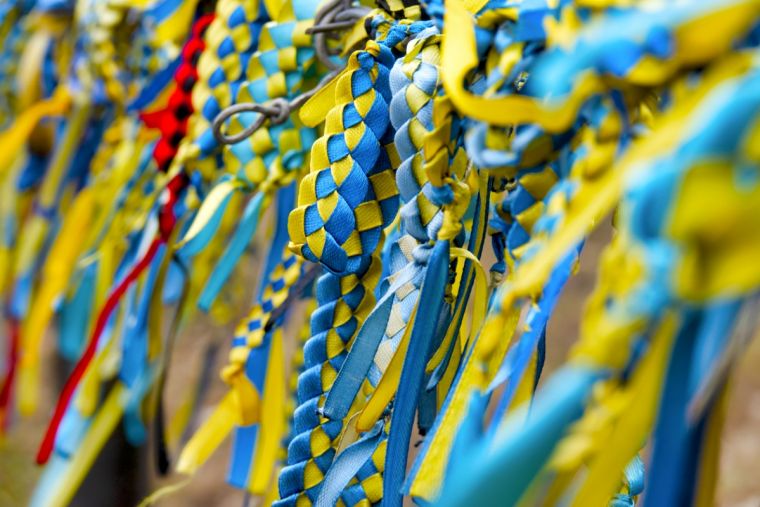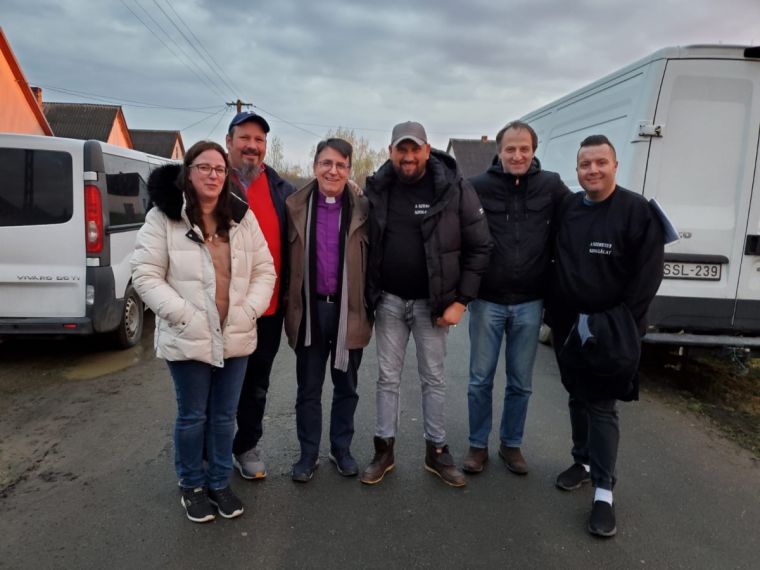Helping Ukrainian refugees through the trauma and distress of war

When Russia invaded Ukraine, it sparked an exodus of refugees as millions fled their homes. But given the choice, many would love to go back, says Bishop Josep Ferrer, who recently visited the country.
Over the course of three days, he visited refugee camps in Ukraine and Hungary where he met some of those who have been displaced by the war, as well as the churches that are supporting them.
"The people I met in Hungary who have left Ukraine and the displaced people I met inside Ukraine all want to go back to their homes," he said.
For some, there is still a sense of disbelief about how quickly their lives have been upended.
One young woman told him she had just got engaged a few weeks before the war broke out and that she had been due to go to university in September to train to become a dentist. Now she is in a refugee camp and her fiancé is on the frontline fighting.
"She had a beautiful apartment; now all her belongings are in a suitcase. This is the reality they are facing," said Bishop Josep.
"We think refugees are poor but the reality is that only a few weeks ago they were just like you and I."
With one family he met in Hungary, the stress was all too apparent. They had arrived in the country just a few days earlier and were so happy and relieved to be out of the warzone in Ukraine and somewhere safe.
But the feelings of relief quickly gave way to distress about how their family would survive in a foreign country, worries for the people they left behind, and concerns about their future.
"Suddenly all the pain of their reality hit them. There was so much distress. There was so much fear and anxiety," he recalls.
Given all the trauma that surrounds the invasion, Bishop Ferrer believes that supporting mental health is one of the biggest needs among refugees.
It's also something that Britons need to be aware of if they decide to become a host, he says, which is why his church, Christ Church, Exmouth, is planning to hold a conference to help UK hosts meet this and other needs.

"We have welcomed Afghan refugees to our town in the past. If we are going to have Ukrainian refugees as well, we need to be aware of mental health issues and the difficulties they will experience being in another country speaking a different language.
"As a Spaniard, I am a foreigner myself so I am aware of the culture shock that comes from moving to a new country and it's really important to help them through this process."
Many families in the church and wider community in east Devon are interested in welcoming Ukrainians into their homes. To Bishop Josep's surprise, most of the Ukrainian refugees he met during his trip "didn't think about England as one of their options".
"Even the churches didn't know," he said.
But when he told them that many people and churches in the UK wanted to welcome them in, they were "very excited".
"They were surprised and glad and happy that there are families in the UK willing to help them."
Now Bishop Josep is helping to connect churches and individuals in Hungary, Ukraine and the UK.
The church has an important role to play, he feels, because the fear of being taken advantage of is real.
One way UK churches could help allay these fears, he suggests, would be to link up refugees with trusted families and individuals within their local communities.
"There is already so much uncertainty thinking about the life they have left behind and not knowing how long the war will last and whether they will stay here or go to another country. But on top of that, there are all the stories of people abusing refugees for things like cheap labour or human trafficking," he said.

"They are really scared about contacting someone online. They wonder, why are these people being so nice to us? Are they for real? Are they really trying to help us?
"Some people really are trying to be nice because they want to help them, but that scares them even more."
Despite all the heartache he witnessed, Bishop Ferrer says he was also inspired by his time in Hungary and Ukraine.
"When we were in Ukraine, we sang and prayed the Lord's Prayer together in three different languages - Ukrainian, Hungarian and English. There were three different languages and many different denominations, but we were one in Christ," he says.
What also moved him was the way in which churches on the frontline are sharing the Gospel.
"People in both Ukraine and Hungary have sacrificed a lot to help refugees and provide for them but they are also preaching the Gospel. They were giving out physical food but also helping people know Jesus.
"Sometimes we forget the spiritual element, so to see the churches in Hungary and Ukraine making sure this was included really challenged me that we must do the same thing here.
"We must give all the practical help we can by opening up our homes, providing food and helping them to find a job, but we also need to share the Gospel."
Looking ahead, Bishop Josep plans to continue supporting needs in Ukraine and its neighbouring countries, and he will soon be returning for another visit.
"There are two things UK churches have to do," he says.
"One is to welcome refugees to the UK but we also need to continuously send support to churches on the frontline so that they can continue to be able to provide food, shelter and resources to refugees.
"Sometimes we forget that Ukraine is massive. It is a very big country and some people walked over 1000km to get from their city to the border with Hungary.
"The cities in western Ukraine are full of refugees from the east of Ukraine. We cannot forget them. We have to continue helping them."











